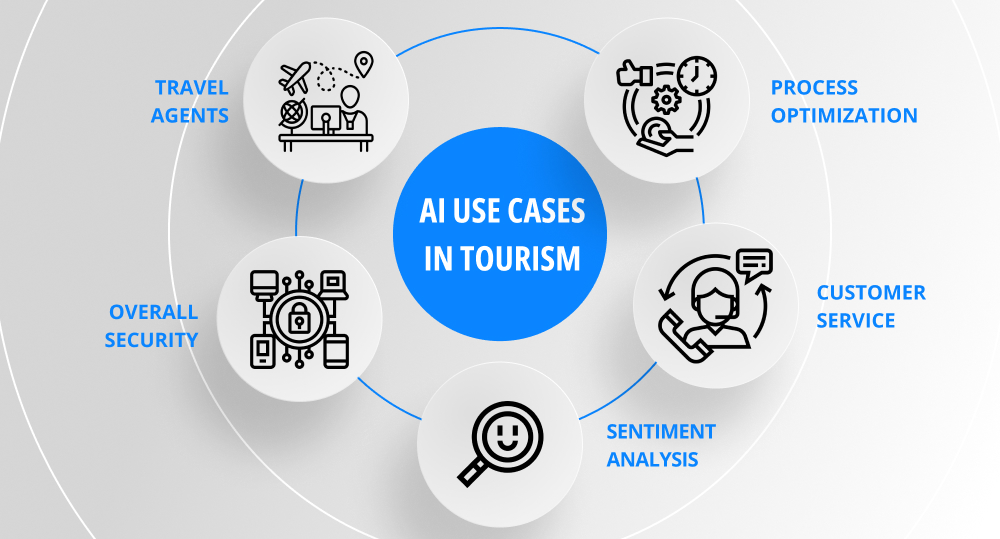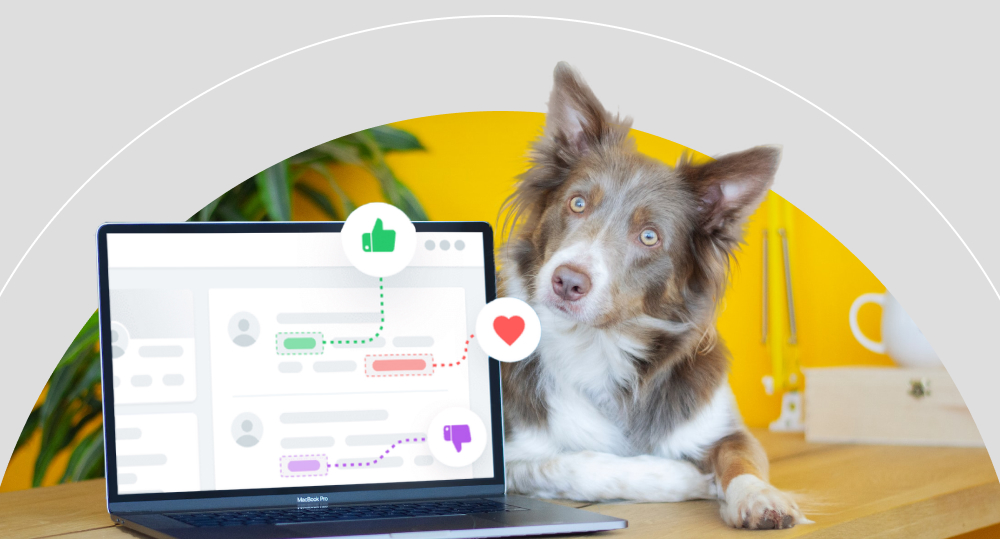If you open your inbox, chances are you'll find several emails with personalized travel recommendations. Most likely, artificial intelligence compiled them (travel agents were hardly involved) based on your search queries and travel history. This is not the only application of AI in the travel industry. Smart chatbots, virtual assistants, customer service automation, and much more never cease to amaze even tech-savvy travelers.
This area is highly promising for software developers, so we invite you to explore it in more detail. In this article, we'll discuss the benefits of using AI technology in the travel and tourism industry, as well as some examples of how travel companies implement them. Ready to get into the game?
written by:
Alexander Arabey
Director of Business Development
Contents
Is It True that AI Makes the Travel Industry Open for Everyone?
The travel industry is one of the most competitive markets in the world. However, for a long time it seemed to be stuck in one place, while other spheres were actively implementing advanced technologies to meet the global trends. Only a couple of years ago, tourism let in the spirit of modernity. Unfortunately, in addition to a huge number of pluses, such drastic changes also have a downside. When a new technology with the potential to change the landscape comes along, it's natural for people to feel both enthusiasm and skepticism.
AI is one such technology that is often touted as a panacea for all sorts of industries. While there are still some concerns about its impact on the tourism sector, many experts believe it will bring only positive consequences. But how?
Here are some recent stats:
- With every travel company using at least one AI-powered technology, the hospitality industry's CAGR is expected to reach 9.7% by 2026. (IndustryARC)
- In the following years, 82% of global airlines plan to try business intelligence to drive operational efficiency and productivity. (Statista)
- 84% of travelers believe that using modern technologies, such as artificial intelligence or machine learning tools, is key to when, where, and how they plan to travel. (Amadeus)
These are predictions, but what positive trends are already out there?
- Affordability. For starters, AI is making the travel industry more efficient, resulting in lower prices and greater accessibility for everyone involved. With this technology in place, customers can get the best deals on travel packages, while agents can pick the perfect romantic or adventurous trip for each client in a matter of minutes.
- Satisfied clientele. From airlines to hotels to travel agencies, artificial intelligence helps businesses deliver high-quality customer service. By using AI to monitor client behavior and preferences, companies offer a more personalized experience, leading to happier customers. And happy customers separate with their money more willingly.
- Positive impact on the environment. AI is not just making it easier for people to move around the globe. It’s also making travel more sustainable. With its power, travel agents can reduce tourism’s impact on the environment by planning better routes and managing resources efficiently. In the future, AI could even help them identify new tourism destinations that are less crowded and more eco-friendly.
These are far from all the optimistic signs we can see today. It is safe to say, however, that as the technology continues to evolve, we’ll soon see more opportunities to benefit from these changes.
Let's go back to the present and take a closer look at what artificial intelligence offers today's travelers.
Counting the Benefits of AI for the Tourism Industry
Since its inception, the tourism business has been on the lookout for ways to make its operations more efficient and low-cost. With the advent of artificial intelligence, it seems the industry has finally found its Holy Grail.
Over the past few years, AI technologies have revolutionized the travel sector in all sorts of ways, from chatbots that help people plan their journeys to virtual travel assistants that handle trip reservations. In fact, several big-name companies are already using it, and the results are very promising for both sides of the industry — businesses and their customers. Here are the benefits, we've seen so far:
Key Advantages of AI for Tourists and Travel Business
Criteria
Travelers
Businesses
Experience
From helping holidaymakers find the perfect vacation packages to providing exceptional customer service during trips, AI makes travel easier and more enjoyable for tourists.
Artificial intelligence eliminates possible human errors, resulting in better business operation, higher quality of customer service, and greater client retention.
Customer Data Analysis
Using data from past journeys and personal preferences, AI can create customized itineraries or sightseeing suggestions.
The technology helps better understand the clientele and make informed decisions based on customer data-driven insights.
Intelligent Chatbots
AI-powered chatbots and virtual assistants can help book flights, hotels, and car rentals with just a few simple commands.
All thanks to artificial intelligence, travel agents’ life have become way easier. By leaving customer service to chatbots, they have more time to focus on more crucial tasks.
Automation
The technology automates many processes — booking, planning, consulting — leading to savings in travelers' time and money.
AI automatically identifies potential issues, such as problems with flight times or hotel availability, before they escalate any further.
Extended Reality
Artificial intelligence offers virtual and augmented reality superpowers to give travelers a preview of their destination.
The tourism and hospitality business gets a chance to reach more clients and make travel smarter and more affordable with virtual trips and adventures.
Dynamic Pricing
With dynamic pricing, tourists can optimize all aspects of their trip, from booking the best hotel rooms to getting the cheapest flights and special deals on activities.
This can be an extremely effective way to maximize revenue, as it allows tourism companies to capitalize on spikes in demand and avoid lost sales due to price fluctuations.
How It Works: Use Cases of AI in Travel and Tourism
Travel companies are under competitive pressure like never. With an ever-growing number of options and an ever more demanding customer base, businesses are looking for creative ways to stay ahead of the curve. One of the most promising tools at their disposal is artificial intelligence.
Let's take an example of several prominent companies to explore the most common uses of AI in the travel and hospitality industry. Maybe some of them will give you an inspiring idea to implement with the help of talented artificial intelligence developers.
AI & Travel Agents
One of the latest trends that most travel agencies and hospitality services are adopting is chatbots and smart digital assistants. They can help agents with such tasks as customer support, booking, and travel recommendations. Their major benefit is 24/7 availability, so customers get assistance any time they need it.
Examples:
- Edward, a virtual concierge at Edwardian Hotels. It's an AI-powered chatbot that was created to act as “self-service” for hotel guests. With it, residents can order room service, send complaints, and get information about local attractions and restaurants.
- Rose, a chatbot at the Cosmopolitan Hotel. Rose is another example of virtual hotel concierges. It's available 24/7 to help guests with hotel reservations, entertainment recommendations, and room service. Thanks to it, the Cosmopolitan Hotel has seen a significant increase in guest satisfaction and repeat bookings.
- Juliet, a virtual travel assistant at WestJet. Canada's second-largest airline developed Juliet to provide a more personalized and efficient booking experience for WestJet customers. It's currently available through Facebook Messenger. When users text WestJet on Facebook, Juliet responds and can answer questions, provide flight options, and book tickets.
AI & Process Optimization
Using AI and machine learning algorithms, travel businesses can streamline various processes to improve customer satisfaction and operational efficiency. These include automated booking, check-in, and luggage labeling processes, real-time flight rerouting, and disruption management. By implementing the latest technology solutions in these areas, companies can not only enhance the customer experience, but also reduce costs.
Examples:
- The 4site tool by Cornerstone Information Systems. This app was developed to help companies handle travel-related disruptions and empower users to take full control of their journey. The result is a comprehensive web-based dashboard for travel managers to proactively address any problems. As for travelers, they also got an intelligent tool with direct access to necessary travel information and timely assistance.
- An AI-based solution for airlines by Boston Consulting Group and KLM Royal Dutch Airlines. With this comprehensive tool, airlines have gained the ability to collect and analyze valuable data about the fleet, crew, ground services, and network. The software aims to optimize flight-related work processes to meet the latest quality standards.
AI & Customer Services
This is another area where AI is extremely helpful. With its recent innovations, travel companies can offer a more personalized service and quicker problem-solving. For instance, travelers can talk to a human or chatbot through an online customer service to address any issues that arise during a trip, whether it's lost luggage or route guidance. After the trip, such smart travel apps can be used to gather feedback and improve customer support in the future.
Examples:
- Intelligent robots at London Heathrow Airport. By contacting them, passengers can get real-time flight information and answers to frequently asked question in multiple languages. Besides, the bots help tourists navigate the airport. They can move freely around and accompany lost passengers to check in or other areas.
- Metis, machine learning software for analyzing guest reviews by the Dorchester Collections hotel group. Dorchester Collections is the owner of luxury hotels. Its team came up with a solution to deliver a superior experience to its wealthy customers by analyzing their feedback. The algorithm is able to gain valuable visitor insights that help hotel owners adjust accommodations to guests' needs and desires.
AI & Sentiment Analysis
Sentiment analysis is the process of understanding how people feel about a particular topic or brand. It's critical for the travel industry, as it can help businesses get a sense of what customers say about them, as well as identify potential problems and opportunities. Here's when AI tools come into play. Using special services, companies analyze client reviews, social media posts, and even live chat conversations. This helps understand how customers feel about the travel experience with a certain company and how its team can make it better.
Sentiment analysis tools:
- Social media platforms;
- Review services;
- Natural language recognition tools.
Examples:
- Google Cloud Natural Language API. This platform relies on machine learning to analyze text and return sentiment information about it. Tourism companies use it for traveler reviews and social media posts to better understand customer opinions about various destinations, airlines, or hotels. The tool can be easily integrated into any app or website with no coding experience.
- PaxPulse by Mindtree. It uses AI and ML algorithms to analyze social media data and identify key trends and issues for the travel and hospitality industry.
- Qualaroo by IBM. It's one of the leading providers of AI-based sentiment analysis solutions. Qualaroo works similarly to its competitors: it analyzes customer feedback data to identify patterns and trends in customer sentiment and improve the travel experience.
AI & Security
Among all the examples of AI in tourism, we shouldn't forget about its use for security purposes. As the travel industry looks to rebound from the Covid-19 pandemic, many airlines and airports are turning to AI. This technology can be used to boost travel security in a variety of ways, from facial recognition and contactless check-ins to temperature screening and intelligent airport baggage handling systems.
Examples:
- Facial recognition software by the Transportation Security Administration. It works in the following way: travelers submit their ID card to a special kiosk, then a camera scans their face for 5 seconds to confirm the person's identity. Since the program is still in the early stages of testing, human agents also inspect documents to double-check the system effectiveness. Being more accurate than humans, the software speeds up the identification process and reduces wait times for passengers.
- BagsID, a baggage handling system. A team of developers has created an app that eliminates the need for airports and passengers to label luggage. The tool uses a combination of machine learning, video and photo analytics to identify and track suitcases on their way from one airport to another. This information can be helpful for improving security procedures and preventing lost or stolen bags.
Booking a Ticket to the World of Artificial Intelligence
The travel industry has been lagging behind other areas in terms of adopting artificial intelligence, but the situation is changing. These days, AI accompanies tourists throughout their journey, from airport check-in and hotel reception to travel blog reviews and lost luggage tracking. By automating repetitive tasks, providing personalized recommendations, and optimizing the customer experience, this smart technology makes travel faster, hassle-free, and convenient. Now, it's up to talented developers to keep it moving at that fast pace, evolving and giving people more ways to discover the world.
Guess AI benefits are now clear to you. How about making travel smarter? Contact Qulix to find out what the latest technological solutions we can offer to bring your boldest idea to life.

Contacts
Feel free to get in touch with us! Use this contact form for an ASAP response.
Call us at +44 151 528 8015
E-mail us at request@qulix.com









